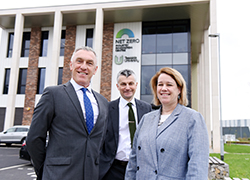New report reveals a rise in anti-Muslim hostility in Britain following acts of terrorism around the world
Muslims in Britain are becoming the target of hate crimes and incidents of retribution for terrorist attacks around the world – according to a new report by Teesside University’s Centre for Fascist, Anti-Fascist and Post-Fascist Studies (CFAPS), based on TELL MAMA data.
Following atrocities in Sydney, Paris and Copenhagen, there was a noticeable rise in anti-Muslim incidents in Britain in the immediate aftermath, the report has found.
It provides evidence that extremists here are reacting to terror attacks taking place in other countries and subjecting British Muslims to retaliatory abuse.
The report, compiled by Professor Matthew Feldman, Professor in Teesside University’s School of Arts & Media, and Dr Mark Littler, CFAPS Research Associate and Lecturer in Criminology at Hull University, is based on data from the TELL MAMA (Measuring Anti-Muslim Attacks) project set up by Faith Matters.
The third in a series of empirical studies, the report covers a year-long reporting period, from the beginning of March last year to the end of February 2015. During that time there were 548 anti-Muslim incidents reported to TELL MAMA. This ranged from online abuse and threats, to street based assaults and extreme violence.
Significantly there were noticeable spikes following high profile terrorist attacks around the world, with the report comparing the number of anti-Muslim incidents in the seven days before and the seven days after each attack.
In the seven days prior to the Charlie Hebdo massacre in Paris, where 12 people were killed, there were 12 reported incidents to TELL MAMA, but in the seven days following there were 45.
This pattern was similar in relation to the terror attacks in Sydney, in December and Copenhagen, in February. Seven days before Sydney there were 10 reported incidents, with 12 being reported in the seven days after. And in the seven days before Copenhagen, 18 incidents were recorded, with a rise to 30 in the following seven days. In the former, the report suggests that the more restrained media coverage of the Sydney attack may have played a role in minimising backlash against the Muslim community in the UK.
The Chair of TELL MAMA, former Government Minister, Shahid Malik, said: 'The media has to work harder to break the link between Muslims and extremism which seems to be the over-riding narrative. By ensuring that we can tackle anti-Muslim hate, we can also reduce the alienation of some young Muslims and reduce the chances of them being preyed upon by extremists.
'These are challenges for Government, for communities and for civil society organisations. It is also a sad fact that when extremism takes place, Muslim communities are sometimes the victims and then suffer forms of anti-Muslim behaviour as the TELL MAMA data shows and which took place after Charlie Hebdo.'
Stuart Andrew MP, the Chair of the All Party Parliamentary Group on Islamophobia, added: 'I commend the important work that Tell MAMA do in recording anti-Muslim hate crime and supporting victims. Their Annual Report 2014/2015 confirms the existence of unacceptable levels of Anti-Muslim hatred that affects our communities, while providing much-needed analysis of hate crime statistics and trends. TELL MAMA’s work has been, and will continue to be, crucial in informing key partners working to combat hate crime.'
Professor Feldman said: 'The analysis offers broad support for the theory of cumulative extremism, with the ratcheting up of violent activity between opposing groups, with an act of violence triggering a response that itself sparks further attacks.'
Dr Littler added: 'Findings also suggest that where the media stress the Muslim background of attacker/s, and devote significant coverage to it, the violent response is likely to be greater than in cases where the motivation of the attacker/s is downplayed or rejected in favour of alternative explanations. The latter appears to be the case with the Sydney perpetrator, who was swiftly and repeatedly identified as mentally ill.'
The 548 anti-Muslim incidents reported over 2014/15 represents a reduction on the 734 cases reported during 2013/2014 – which is most likely accounted for by the enormous spike in anti-Muslim attacks in the weeks following the savage murder of Drummer Lee Rigby on 22 May 2013. The overall number of reports is consistent with the picture presented in 2012/2013, when 584 cases were recorded.
This latest study has found that children as young as ten were carrying out hate crime incidents, although the main perpetrators were identified as being over 40-years-old.
402 total cases were recoded as taking place online, with less than half of all recorded incidents, offline and online, being reported to police by victims. In the offline incidents, the majority were perpetrated against women and, in a significant number of cases, the victim was wearing religiously distinctive clothing.
 International partnership signed with prestigious American
...
International partnership signed with prestigious American
...